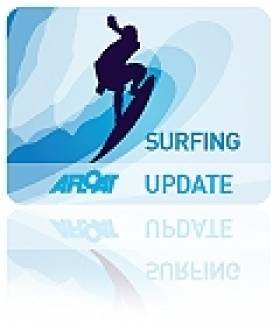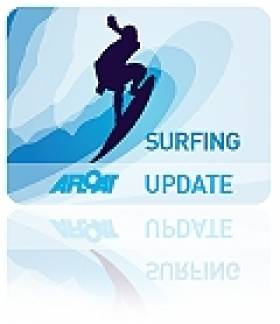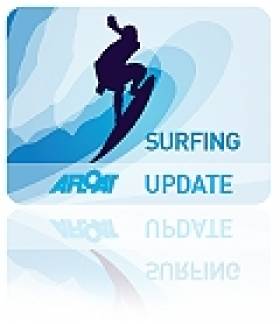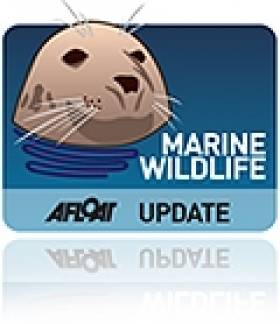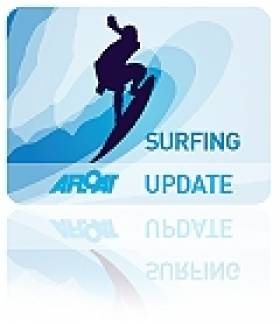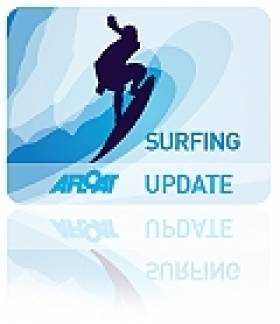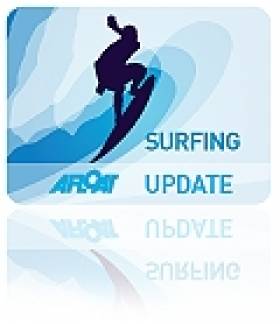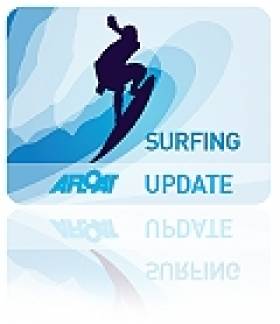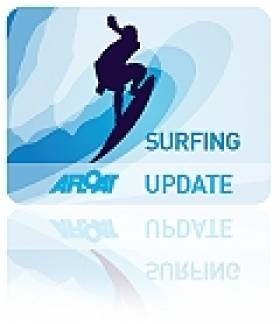Displaying items by tag: Surfing
Irish 'Happy to Be a Part' of First SUP and Paddleboard Worlds
#SURFING - Team Australia proved that when it comes to watersports, they're a step above most of the competition at the inaugural ISA World Stand-Up Paddle (SUP) and Paddleboard Championships in Lima, Peru recently.
The paddleboarding duo of Brad Gaul and Jordan Mercer each won three gold medals, along with the team gold medal and the perpetual Club Waikiki Trophy, which will be awarded to the overall team champion every year.
But for every powerhouse team like Australia, the USA and South Africa, there were teams like Ireland who arrived at the world championships to represent themselves well, but also to be able to say they were there for the beginning of something big.
"The event was just amazing, such a positive vibe amongst all the competitors, everybody that we met from local organizers to everyone at our hotel or the drivers," said Finn Mullen, who competed along with teammates Dave Owens, Paul Byrne, Ed O'Farrell, Keith Gorman and Jane Downes.
"They were all so stoked to have the contest and see us all here," Mullen added "and there was like this amazingly friendly vibe in the water, because really they were being super gracious to us, giving us the break for the entire week, and they couldn't be more accommodating and I couldn't me more happy that I was able to be a part of it."
Video: West Coast is Winter Hotspot for Surf Pros
#SURFING - Conor Conlon of CMP has produced this wonderful video of top professional surfers taking on the Atlantic swells of the west coast this winter.
Setting up his gear on the shore during a window of clean swell, Conlon captured the likes of Aaron Dees, Conor Maguire, Easkey Britton and newly signed Ripcurl rider Noah Cohen catching the waves (more photos and video HERE).
Irish Six in Peru for SUP and Paddleboard Worlds
#SURFING - A six-strong Irish team is in Peru to compete in the inaugural World Stand-Up Paddle and Paddleboarding Championships, which commence today (19 February).
The surfers have travelled at their own expense to the Peruvian capital Lima to take part in the International Surfing Association-sanctioned event, where they will contest against paddleboarders from 19 other countries.
“It is the first of its kind and we wouldn’t want to miss out," team member Paul Byrne told TheScore.ie. "The fact that it has been recognised enough to hold an international competition means stand-up padding (SUP) is here to stay.”
Dubliner Byrne first got involved in SUP in Australia, and found on his return to Ireland that he and his friends didn't need to seek out the popular surf out west to keep up with the sport - the swell produced by ferries in Dublin Port is just what they needed (see video of Dave Owens above).
Byrne joins Owens, Finn Mullen, Ed O'Farrell, Keith Gorman and Jane Downes in South America for the World Championships, which run till 25 February.
“We been competing in Europe," he says, "but it is sure to be tough against surfers who are sponsored to do it for a living.”
Humpback Whale Spotted Off Achill
#MARINE WILDLIFE - The Irish Whale and Dolphin Group has confirmed the sighting of a humpback whale off Achill Island in Co Mayo last weekend.
Surfers off Keel Beach were credited with the discovery, after spotting a large whale of 30-60ft breaking the surface multiple times, lifting its tail fluke vertically.
The sighting is only the fifth validated record of a humpback whale off the coastal area from Galway to Donegal.
"It remains something of a mystery as to why sightings of this species remain such relatively rare events along our west and northwest compared to our south and southwest coasts," says IWDG sightings co-ordinator Pádraig Whooley.
"This latest sighting is a timely reminder that species such as humpbacks can and do turn up in places that are well outside what we perceive to be the known 'hotspots'."
Humpback whales tend to feed in inshore waters, which should make them increasingly easier for the public to spot from the shore, he added.
The IWDG has more on the story HERE.
Top German Surfer Tries Ireland's Waves for Size
#SURFING - One of Germany's top surfers was in Ireland last week to sample some of Ireland's biggest waves, InsideIreland.ie reports.
Sebastian Steudtner was in Sligo to films a series of online views for Tourism Ireland in Frankfurt to pique the interest of German surfers and holidaymakers.
As well as mountain biking at Knocknarea and Union Woods, Steudtner took on the monster swells at Mullaghmore Head - made popular among the world's big wave surfers by the Tow-In Surf Session that's now in its second year.
The 'teaser' videos for a larger TV and online project will be premiered next week at the Berlin International Film Festival before hitting the web later in spring.
Kristina Gauges of Tourism Ireland said: "This is a fantastic opportunity to showcase the world-class surfing and adventure product available in this part of Ireland to a niche audience in Germany."
InsideIreland.com has more on the story HERE.
Surfing Novices Welcome in the Sunny Algarve
#SURFING - Rachel Collins writes in The Irish Times recently of her experiences learning to surf in Portugal's sunny Algarve.
"Thousands of hardy souls follow the waves around the Irish coastline," she writes, "but for rookies sacrificing themselves to the sea, the warmth of the Algarve makes it the perfect place to learn."
The "friendly, welcoming atmosphere" at Lagos, near Faro - with direct daily flights from Dublin - will surely put any surfing beginner at ease, as well as making for "a welcome break from the cold Irish winter".
And with plenty of other activities on offer, from the nightlife, shopping, fine dining and relaxing sandy beaches to kitesurfing, wakeboarding, mountain biking and rock climbing, there's something for all interests.
The Irish Times has more on the story HERE.
Ireland to Showcase 'Planet's Biggest Waves' on 2012 Kite Surf Tour
#KITESURFING - Ireland will be one of four stops on the 2012 Kite Surf Pro World Championship Tour to decide the best wave kitesurfers in the world, Surfer Today reports.
Kicking off in Cascais, Portugal in June before heading to Mauritius in September, the tour will come to Ireland's west coast - described as "Europe's secret kite surfing jewel and home to one of the planet's biggest waves" - from 19-28 October.
According to Surfer Today: "Ireland's Kite Surf Pro will incorporate a unique mobile format, capable of showcasing each day's action at the choicest of locations on the country's wild and swell-abundant west coast."
The tour will wrap up in Maui, Hawaii from 29 November to 8 December, where the €15,000 prize purse wil be up for grabs at the famed surfing venue of Ho'okipa.
Surfer Today has more on the story HERE.
Surfing's World Body to Roll Out Drug Screening
#SURFING - The world governing body for surfing is set to roll out drug screening for competitors and officials at its sanctioned events this year.
As The Guardian reports, the move by the Association of Surfing Professionals (ASP) comes after the drug-related death of top surfer Andy Irons in November 2010.
The former three time world champion was found to have died from a hart attack combined with "acute mixed drug ingestion".
Irish surfer Gerry Fitzgerald told the paper that drug-taking is "not sustainable" for top-level surfers on the circuit. "Athletes are training hard, the way the contests are now, it will catch up with you," he said.
Testing for performance-enhancing and recreational drugs is already carried out at a number of professional events in the UK and Ireland, according to This Is Cornwall.
Matthew Knight of the steering committee for the British Surf Championships welcomed the change, admitting that surfing had been a "dinosaur" in its approach to drug testing and needed to catch up with other sports.
However some concerns have been raised that the move could damage surfing's credibility as an 'underground' phenomenon.
"Part of its appeal is that it is counter-cultural, marginal and in some way subversive and that's where the association with drugs comes in, whether real or mythic," surfer and author Andy Martin told The Guardian. "How mainstream can surfing be before losing its soul?"
'World's Biggest Waves' Off Irish Coast?
#SURFING - One of Ireland's top surfers claims he has found the world's biggest waves off the coast of Ireland.
As Irish Central reports, Portrush waverider Al Mennie says that he and surfing partner Andrew Cotton have found two waves reaching as much as 120 feet in secret locations off the coasts of Antrim and Donegal.
The duo are currently waiting for the right conditions to surf the biggest swells.
"The good days are few and far between – 90 percent of the swells are unrideable and we'd reckon that only two days each year are rideable," Mennie told the Irish Independent.
Their location is being kept under wraps for now due to safety concerns, as the waves crash down in a hazardous rocky area - making them definitely not suitable for novices.
Irish Central has more on the story HERE.
Young Bundoran Surfer Joins Northcore Stable
#SURFING - Irish surfer Conor Maguire is one of the four new waveriders from the UK and Ireland to become part of the Northcore stable. In the vid below Maguire is mentioned at 2 minutes 11 seconds.
The Bundoran resident joins Sandy Kerr of Tynemouth, England, Craig Burrows of south Wales and Jersey's Charlotte Bayliss on the team heading into 2012.
The young surfer is already making a name for himself on the heavy waves of Ireland's northwest coast like the Peak, and regularly paddling into the meanest of Ireland's slabs such as Rileys.
Maguire is also starting to charge in the big swells, learning the tow-in craft from some of Ireland's most experienced big wave crews, including Northcore ambassador Richie Fitzgerald.
A Northcore spokesperson said of the recent additions: "Between them there's a huge amount of experience, style and skill. All of the riders are representing the very best of surfing talent from their respective home locations and all have achieved respect and recognition on a national scale."


























